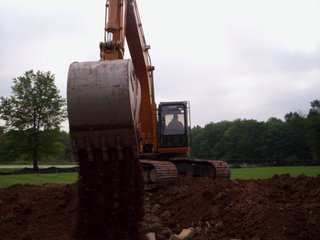 Long time readers know that I'm in the environmental consulting business. Among the services I offer is treatment or removal of contaminated soil. In the last year I've done projects ranging from removal of PCB-impacted soil to lead-impacted soil.
Long time readers know that I'm in the environmental consulting business. Among the services I offer is treatment or removal of contaminated soil. In the last year I've done projects ranging from removal of PCB-impacted soil to lead-impacted soil.
In this business, alot of the work focuses on treating fuel contaminated soil and to this point the options are essentially limited to removal and thermal desorption, treatment by biological means or chemical fixation.
That may change as the Aussies have hit on a new remediation method:
Soil polluted by organic toxins can be blasted clean with ultrasound, say researchers in Australia. The method may prove to be more effective at cleaning up contamination from oil refineries, power stations and aluminium factories than existing methods.
[...]
Sosa Pintos and colleagues developed a prototype system that works more effectively, she says. Contaminated soil is mixed with water and passed through a chamber that blasts the mixture with ultrasound. The team tested their system on sand spiked with pollutants as well as samples collected from industrial sites and claim that it destroys up to 97 per cent of contaminants in just a few minutes.
Sound waves travel through water as a series of high pressure waves with low pressure areas in between. The low pressure causes the water to boil and form microscopic bubbles. The high pressure then forces the bubbles to collapse, generating a shockwave that produces localised temperature flashes of more than 4000°C and pressures of about 1000 atmospheres. That is more than enough to break down any complex molecules in the water, Sosa Pintos says.
In a slurry mixture, these bubbles form around the edges and surfaces of solid suspended particles – exactly where pollutants tend to end up. "Since these chemicals are hydrophobic, they are readily absorbed onto the surface of soil particles, so the energy released is selectively directed towards them," explains Sosa Pintos.
I wonder what the costs involved are and whether or not this can be used on a large scale but it's pretty cool if they can work out the kinks.
Sorry to bore you with the shop talk, we now return you to your regularly scheduled rants.
Thursday, September 07, 2006
Environmental Shop Talk
Sphere: Related Content
Posted by
Scott
at
7:13 AM
![]()
Subscribe to:
Post Comments (Atom)







No comments:
Post a Comment